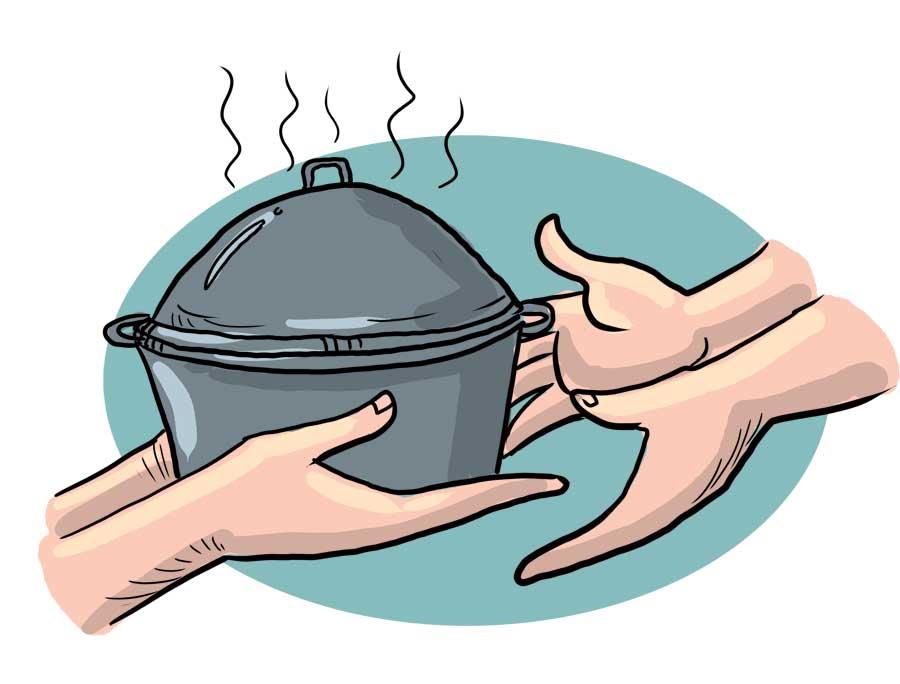17 Jun 2022 - {{hitsCtrl.values.hits}}

Sri Lanka is seeing the first signs of some sections of the community thinking of whether the ‘neighbour’ had his or her meal. Just the other day ‘Sarvodaya’ together with ‘Singularity Sri Lanka’ organised a ‘community kitchen’ to ensure that people in the Grandpass area had a solid meal for dinner. The food kitchen was held on June 14 at the St. Joseph’s Church in Grandpass and as many as 1700 people were fed. For the record dry rations were also distributed.
The initiative was held to serve members of low income families affected by a food shortage. We don’t have to mention here that Sri Lanka is at present facing a severe economic crisis where several unskilled labourers have lost their jobs. Food prices have doubled stifling the buying power of low income families.
This is the time to spread the culture of food kitchens and the idea that the authorities need to address all questions associated with ‘food security’. Food security is threatened when members of a community are not sure when they’ll receive their next nutritious meal. It’s in such an environment that members of a community come together and pool resources to cook large quantities of food. Most often this happens when the role of government agencies is absent during a crisis.
Like with the heartwarming initiative taken at Grandpass things do really happen when social activists take charge of a situation. This regime under a new prime minister is not giving people much hope because of the tendency to spell it out to people, on a daily basis, how pathetic the economic situation in the country is. The unsaid message by the regime, each day, seems to be ‘we will tell you the problem daily and you find the solutions’.
But hunger can open the eyes of affluent people who can do something for the community. If this gesture of kindness spreads like the general weather pattern in June-that helps promote outdoor activities and sports-the less fortunate doesn’t have to go hungry.
The community kitchen concept has a long history and dates back to the time of 1481 AD when the Sikhs managing the Golden Temple’s activities made arrangements to feed people with free meals. That practice has continued since the time of Guru Nanak; having had only two short breaks when the practice was broken. Those meals were associated with religious functions. Sri Lanka too has a similar history and about offering free meals during Poya Day; which is associated with the Buddhist teachings on giving alms to cultivate non-attachment to worldly materials.
But the food kitchen culture devoid of religious connections would serve this humanitarian purpose better. History has shown us how food kitchens have operated after a war, during recession and an economic downturn. After the war between Georgia and Abkhazia in 1994 food kitchens were established to feed the needy. There are records to show that there were food kitchens in several countries during the great recession and when global inflation stifled countries; a period which began in late 2006.
And there are psychological connotations to a free meal at a community kitchen. A person visiting such a facility would feel that he has no self-worth. But literature associated with community kitchens also underscores a positive side to it. Community kitchens have the potential to offer alternative livelihood opportunities to unemployed females and unskilled labour. The United Nations has also highlighted that such a facility can change stigmatised attitudes and behaviours related to HIV patients and sex workers; thereby promoting the spirit of tolerance.
The concept of community kitchens must be promoted as much as possible in a country like Sri Lanka because the hopeless situation is leaving room for dangerous practices like chain snatching and petty robberies. There are stories of Sri Lankans attempting to migrate; which is often facilitated by individuals offering illegal paths. More and more people will soon feel the ‘hunger’. Hence community kitchens carry the potential to ease the burden on the less fortunate citizens and also ensure that they are not undernourished.
27 Nov 2024 24 minute ago
27 Nov 2024 34 minute ago
27 Nov 2024 38 minute ago
27 Nov 2024 56 minute ago
27 Nov 2024 2 hours ago